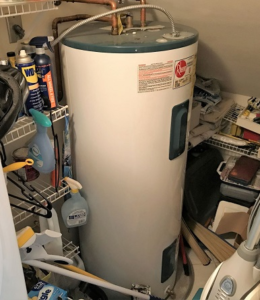Water Heater Installation Denver is a project that is typically best left to professionals who can ensure that it is done correctly and up to code. Water heaters are complicated pieces of equipment with many specialized components.
For instance, if the water heater will be installed in a gas-powered home, it must adhere to venting requirements. This could include modifying existing ventilation systems, which can add to overall installation costs.

During water heater installation, it is important to consider the location. The position of the unit impacts its efficiency and the ease with which hot water can reach your home’s appliances. It also determines the cost of installation and maintenance.
A poorly located water heater can lead to a variety of problems. For example, if the heater is located in the attic, it can leak into the ceilings and cause serious damage. In addition, the heat and moisture from the heater can short out wiring, resulting in expensive electrical repairs.
Another important consideration is the size and type of fuel used. While most people are familiar with electric water heaters, gas models still play an important role in some homes. In these cases, the installer must ensure that the home has the necessary natural gas or propane connection and that there are no obstructions such as chimneys.
The location of the water heater should also be considered in terms of its proximity to points of use. In this way, you can reduce the time it takes for hot water to travel from the water heater to the bathroom or kitchen faucets. It is also important to take into account any alterations that may be required to the existing plumbing and gas line connections. Depending on the location, these alterations can significantly increase the cost of installation.
Lastly, it is important to remember that certain water heaters have special features such as energy-saving technology or smart controls. These features often require more complicated installation procedures and can significantly raise the overall cost of the project.
The garage is a popular space for both tank style and tankless water heaters. This is especially common in newer subdivisions like those found in However, it is important to keep in mind that tank style units should be installed under a roof and properly insulated. This will protect the unit from weather and other environmental factors.
There are some things about a water heater installation that are best left to professionals. This project involves complicated wiring and piping, and you will need to take into account building codes and safety standards. It is not a job for the do-it-yourselfer, as mistakes could lead to leaks, fire hazards and electrical problems. You will also need to obtain the proper permits and approvals before starting any work, and you may even need a plumber to inspect your work to ensure it meets local plumbing codes.
The size of your water heater and how much hot water you require often go hand in hand. Before any installation begins, your contractor should conduct measurements and check your property to determine if the chosen option will fit within the physical space available. Choosing the wrong water heater size can lead to poor energy efficiency, a higher risk of failure or replacement, and a general lack of hot water that will not meet your needs.
Different water heaters operate on various fuel sources, including electricity, gas and propane. The cost and availability of these fuels in your area will influence your decision. Additionally, some regions offer energy-efficiency incentives or rebates.
If you have an electric water heater, it will not need a chimney, but you should still stow it securely and protect the wiring by covering it with a metal box to prevent heat loss. An oil or gas tank, on the other hand, will need to be stowed safely and secured, and you will need to install an exhaust pipe to vent the unit outside.
In earthquake-prone areas, your water heater will need to be strapped or anchored to prevent it from moving and potentially injuring or damaging people. The manufacturer’s instructions should include specific details on how to secure the unit. Your contractor will also need to install a temperature and pressure relief valve, discharge pipe and any other required components.
Most jurisdictions require that you pull a permit before installing a new water heater. This helps protect the public from dangerous problems such as gas leaks, electrical issues and improper venting. It also ensures that the installation is done by a professional who knows the requirements of your local building codes and safety standards.
The type of water heater you choose and the specific installation requirements will determine whether or not you need a permit. For example, changing from an electric to a gas water heater requires significant changes to the electrical system of your home and may necessitate a permit. In addition, changing the size of the breaker or wiring can also require a permit.
Often, your plumbing contractor will obtain the necessary permit on your behalf. This is the easiest and most convenient way to go since your plumber is best equipped to understand the specific installation requirements for your water heater and the corresponding permit requirements.
The location of your water heater will also determine whether or not a permit is required. In general, your water heater should be located within 5 feet of your household sewer connection and 10 feet of a safety shut off valve. In addition, the water heater must be supported with a bracing system that is specifically designed for your water heater and installed in accordance with the manufacturer’s instructions. A level service space not less than 30 inches (762 mm) in length and 30 inches (762 mm) in width must be provided at the front or service side of your water heater for inspection, service and removal.
It’s important to get your water heater replaced by a licensed and insured professional to ensure that you are pulling the proper permits and meeting all of your local safety and building code requirements. Not only does this help protect you from potential hazards, but it can also save you money in the long run by helping to keep your insurance rates low and by ensuring that your renovations are up to code for resale or rental purposes.
If you are replacing a water heater, shut off the power and gas supplies to the old appliance. Turn off the circuit breaker that serves it, then remove the unit from its location and prepare to move it. It is important to use an appliance dolly and have a second person to help lift and move the water heater. The unit is heavy and moving it improperly can result in back or other injury.
Before attempting to remove the existing hot water heater, remove its electrical cover plate at the side or top of the appliance. This will give you access to the wires that connect it to your home’s electricity supply. Make sure that the incoming power is not live by using a non-contact voltage test pen or a multimeter, and then disconnect the wires from their terminals. Carefully mark the locations of each wire so that you can re-connect them on the new hot water heater.
Remove the rusty dip tube from the drain valve at the bottom of the water heater and replace it with a new one that comes with your new appliance. Make sure that it is rated for your system.
Using the manufacturer’s instructions, reconnect the new hot and cold water line connections to the water heater’s nipples. You may have to solder the copper pipe assemblies to get them to fit properly.
If the new unit uses natural gas, check to see if your gas line is large enough for the size of the new water heater. If it’s not, have a licensed gas contractor install a new line.
If the new tankless water heater is a gas model, be sure to follow the manufacturer’s instructions for venting. It is important to vent the unit correctly so that carbon monoxide does not build up in your home.
